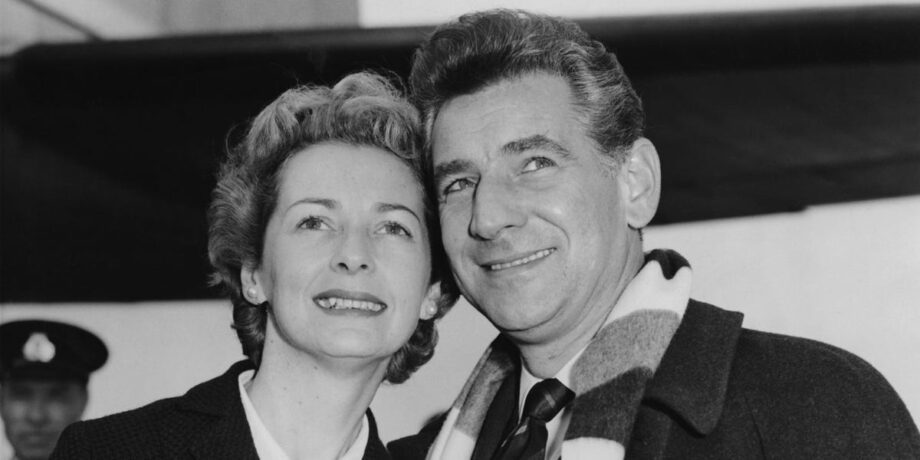- In 1970, composer Leonard Bernstein and his wife Felicia Montealegre held a fundraiser to support the Black Panther Party, which sparked significant backlash.
- The event was criticized as an example of ‘radical chic,’ implying that the liberal elite were engaging with radical causes for social gain.
- Despite the controversy, Bernstein and Montealegre remained committed to advocating for racial equity and human rights causes.
On January 14, 1970, Felicia Montealegre, the wife of composer Leonard Bernstein, organized a highly controversial fundraiser party to support the Black Panther Party.
That evening, nearly 100 people — from wealthy socialites and celebrities to esteemed journalists — gathered at the Bernsteins’ Park Avenue duplex to offer support to the families of the Panther 21. This group of 21 members of the Black Panther Party had been accused of conspiring to kill police and bomb New York City police precincts, department stores, and other public buildings in April 1969.
The Panther 21 had been held in jail for nine months without a trial or adequate resources to prepare for their defense. The Bernsteins sought to change that.
The party wasn’t out of the norm for the couple. When she wasn’t acting on Broadway stages or the TV screen, Montealegre engaged in social activism, including as the first chair of the Women’s Division of the New York Civil Liberties Union and as a vocal supporter of the anti-war grassroots campaign Another Mother for Peace.
As for Bernstein himself, he was a longtime Democrat who often hosted civil rights leaders at parties.
“There they were, the Black Panthers from the ghetto and the black and white liberals from the middle, upper-middle and upper classes studying one another cautiously over the expensive furnishings, the elaborate flower arrangements, the cocktails and the silver trays of canapés,” The New York Times reported the next day.
David Fenton/Getty Images
The party became one of the Bernsteins’ most notorious episodes amid their tumultuous marriage. But the controversy was not included in the recent biopic “Maestro,” directed by and starring Bradley Cooper as Bernstein (Carey Mulligan plays his wife, Montealegre).
‘Radical chic’
The backlash to the idea of the liberal elite commingling with the radical Panthers was immediate and explosive. The day after the Bernsteins’ event, The Times published an editorial condemning the fundraiser as representing “the sort of elegant slumming that degrades patrons and patronized alike.”
“It might be dismissed as guilt-relieving fun spiked with social consciousness, except for its impact on those blacks and whites seriously working for complete equality and social justice. It mocked the memory of Martin Luther King Jr.,” The Times’ editorial board wrote.
Several months later, New York Magazine published a scathing satirical essay by Tom Wolfe, which poked fun at what Wolfe called the “radical chic” — those who supported radical causes for social gain.
The criticism came on the tails of the 1963 March on Washington and the broader Civil Rights Movement. Organizations like the National Association for the Advancement of Colored People had become mainstream, and critics like Wolfe lambasted the phenomenon of white guilt and armchair agitation, which refers to someone who claims to have radical aims without taking action to realize them.
Pictorial Parade/Getty Images
Hate mail and undercover FBI agents
The same day the Times op-ed was published, Montealegre wrote a response and delivered it personally to the newspaper’s office, though it wasn’t published until five days later. In it, she defended the “deeply serious purpose” behind their gathering.
“The frivolous way in which it was reported as a ‘fashionable’ event# The Bernsteins’ Advocacy for Social Causes
On May 13, 1971, after a year since a controversial fundraiser, the Panther 21 were acquitted of all charges. Despite facing backlash and hate mail, the Bernsteins remained dedicated to advancing racial equality and human rights. Felicia Montealegre, Leonard Bernstein’s wife, collaborated with Coretta Scott King and others in critiquing the New York State parole system, advocating for its abolishment. Additionally, Montealegre worked in Chile, her home country, for Amnesty International, during a time of political turmoil and human rights violations under military rule.
After Montealegre’s passing in 1978, Bernstein established the Felicia Montealegre Bernstein Fund of Amnesty International USA to continue her support for human rights activists. In 1980, Bernstein publicly accused the FBI of instigating hatred and discord among different minority groups. These actions highlight the Bernsteins’ enduring commitment to advocating for social justice and humanitarian principles despite facing adversity.



